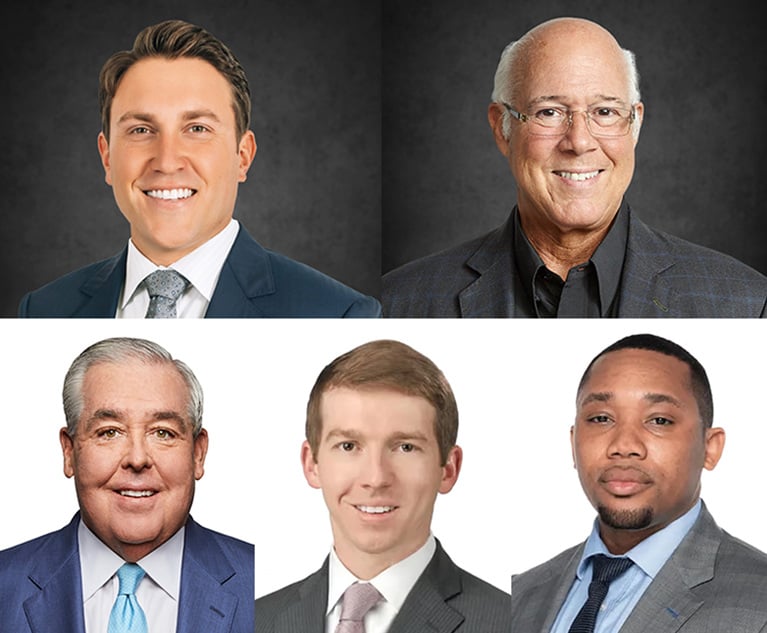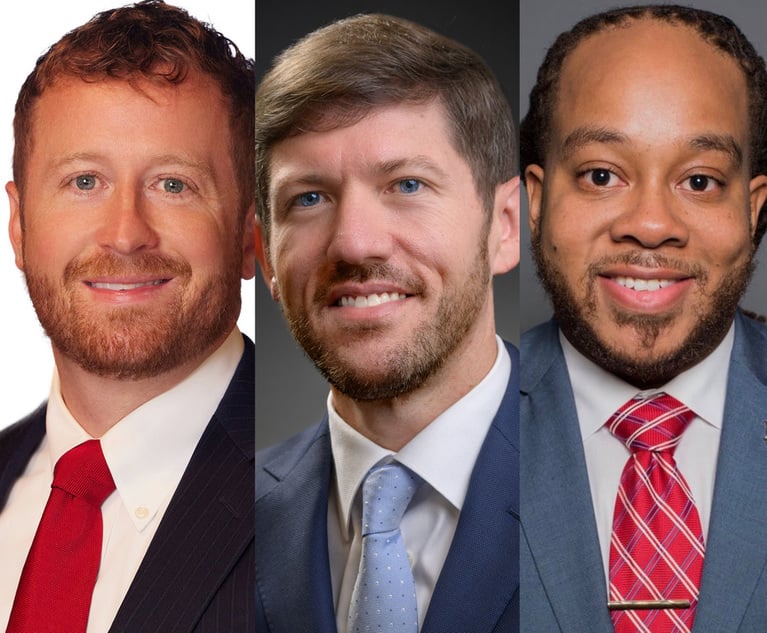Toyota Battles Accident Victim's Family Over Lawsuit Following Settlement
Toyota is battling to limit potential damages in a wrongful death case filed 23 years after the automobile manufacturer settled a personal injury case based on the same catastrophic injury and product liability claims.
December 11, 2017 at 04:42 PM
5 minute read
 Frank Lowrey (left) and Roy Barnes
Frank Lowrey (left) and Roy Barnes
A legal brawl stemming from a 23-year-old settlement of a catastrophic personal injury case against Toyota Corp. has raised “a novel unsettled question of Georgia law,” according to a federal judge who asked the Georgia Supreme Court for guidance.
On Monday, the state high court heard oral arguments on the question posed by by U.S. District Judge Richard Story—whether and to what extent damages may be recovered in a wrongful death suit more than two decades after the underlying claims were litigated in a personal injury suit based on the same catastrophic event.
The case has pitted Toyota—defended by veteran appellate attorney Frank Lowrey of Atlanta's Bondurant Mixson & Elmore—against former Georgia Gov. Roy Barnes and veteran personal injury attorney Robert Cheeley, who are representing the husband of the brain-damaged victim.
The certified question before the high court asks whether damages that may be recovered in a pending federal wrongful death case are limited by a settlement the decedent's husband entered into in an earlier personal injury suit settling all then-pending claims. If so, Story asked, what damages in the wrongful death case might be barred?
Barnes and Cheeley argued that a high-low settlement agreement hammered out between Toyota and plaintiff Anthony Bibbs in 1994 after a collision left his wife, Delia Bibbs, with catastrophic brain damage did not release Toyota from claims stemming from any future wrongful death action. They also contended that, because a Fulton County jury eventually determined that Delia Bibbs' Toyota van was defective, they should not have to relitigate the product liability question the Fulton jury had decided in Bibbs' favor.
In 1992, Delia Bibbs, then 36, was left in a permanent coma after a car slammed into her Toyota van. Bibbs was ejected after her seat belt failed and the front passenger door swung open. She died in 2014, having never recovered consciousness.
Her husband sued Toyota, contending that the van's seat belt latch and door locking system were defective. In 1994, as a jury deliberated, Bibbs and his attorneys agreed to a confidential high-low settlement that would supersede the jury's verdict. The jury eventually returned a $36.5 million verdict—higher than the settlement cap, which Toyota paid but which remains confidential.
After Delia Bibbs' death, her husband sued Toyota again, this time in federal court in Atlanta, for her wrongful death.
Neither side disputes that the 1994 settlement specifically exempted a future wrongful death claim. But that didn't stop Toyota from continuing a fight it eventually lost in Fulton State Court and on appeal that the settlement agreement, despite the language it contained, resolved any future wrongful death claims related to Delia Bibbs' injuries.
Now, Toyota lawyers contend that despite the exemption, the settlement resolved all damage claims linked to the accident except for funeral expenses associated with Delia Bibbs' death. Lowry argued Monday that in filing the new suit, Bibbs is seeking a double recovery for the same catastrophic injuries the 1992 suit settled.
Story's rulings in the pending federal case favored Toyota. He determined, because Toyota in settling never admitted liability and no final judgment ever was entered, that the company may challenge anew Bibbs' product liability claims in federal court. The judge also agreed with Toyota's lawyers that Bibbs may only recover damages that were not available in the earlier personal injury case and that any overlapping potential damages would be “tantamount to permitting double recovery.”
But Story, after consideration, decided not to restrict damages to the intangible value of Delia Bibbs' life since she had been in a coma. “Limiting wrongful death damages in that way would defeat the purpose of Georgia's wrongful death statute, which is to penalize and deter negligent homicide,” Story ruled.
On Monday, Cheeley argued for Bibbs that there was no judgment in the underlying case because of the settlement terms and accused Toyota of “attempting to capitalize” on that condition by insisting now that the lack of a final judgment required that the product liability claims must be relitigated.
Supreme Court Justice David Nahmias sought to pin down the scope of damages available through the wrongful death claim. “That's the main issue,” he said.
“It's all damages,” Barnes argued, because any wrongful death claim had been specifically exempted from the settlement agreement.
Barnes also insisted: “There is no double recovery. … There are two separate causes of action.” The pending suit, he said, is “not for injury suffered by the deceased but injuries suffered by the beneficiaries as a result” of her death. Those damages, he argued, accrue “only by reason of the death.”
But Lowrey countered that all damage claims arising from Delia Bibbs' coma “past, present and future” were released by the 1994 settlement.
Justice Mike Boggs pushed Lowrey to distinguish between a wrongful death and a personal injury claim. “It seems to me your argument is that the damages that potentially could be raised in a wrongful death case are simply consumed by what was the personal injury case,” he said.
Justice Nels Peterson suggested that, “For us to conclude that you win, … we have to conclude that a rational jury can reasonably find that someone who is still alive, albeit in a dramatically diminished capacity, has a continuing human life [value] of precisely zero.”
Said Lowrey: “When the plaintiffs said Delia Bibbs' life effectively ended at 36, it was not a rhetorical flourish. It was accurate. … All the components of the full value of life were equally robbed by a permanent coma. … Other than burial expenses for premature death, I can't think of anything that wouldn't have been recoverable for personal injury.”
This content has been archived. It is available through our partners, LexisNexis® and Bloomberg Law.
To view this content, please continue to their sites.
Not a Lexis Subscriber?
Subscribe Now
Not a Bloomberg Law Subscriber?
Subscribe Now
NOT FOR REPRINT
© 2024 ALM Global, LLC, All Rights Reserved. Request academic re-use from www.copyright.com. All other uses, submit a request to [email protected]. For more information visit Asset & Logo Licensing.
You Might Like
View All
Morgan & Morgan Litigators Flip $3.75M Jury Verdict Into $5.6M Settlement With State Farm
5 minute read


Muscogee Co. Jury Returns $42M Verdict Against Garbage Company After Collision Results in Amputation
13 minute readTrending Stories
Who Got The Work
Michael G. Bongiorno, Andrew Scott Dulberg and Elizabeth E. Driscoll from Wilmer Cutler Pickering Hale and Dorr have stepped in to represent Symbotic Inc., an A.I.-enabled technology platform that focuses on increasing supply chain efficiency, and other defendants in a pending shareholder derivative lawsuit. The case, filed Oct. 2 in Massachusetts District Court by the Brown Law Firm on behalf of Stephen Austen, accuses certain officers and directors of misleading investors in regard to Symbotic's potential for margin growth by failing to disclose that the company was not equipped to timely deploy its systems or manage expenses through project delays. The case, assigned to U.S. District Judge Nathaniel M. Gorton, is 1:24-cv-12522, Austen v. Cohen et al.
Who Got The Work
Edmund Polubinski and Marie Killmond of Davis Polk & Wardwell have entered appearances for data platform software development company MongoDB and other defendants in a pending shareholder derivative lawsuit. The action, filed Oct. 7 in New York Southern District Court by the Brown Law Firm, accuses the company's directors and/or officers of falsely expressing confidence in the company’s restructuring of its sales incentive plan and downplaying the severity of decreases in its upfront commitments. The case is 1:24-cv-07594, Roy v. Ittycheria et al.
Who Got The Work
Amy O. Bruchs and Kurt F. Ellison of Michael Best & Friedrich have entered appearances for Epic Systems Corp. in a pending employment discrimination lawsuit. The suit was filed Sept. 7 in Wisconsin Western District Court by Levine Eisberner LLC and Siri & Glimstad on behalf of a project manager who claims that he was wrongfully terminated after applying for a religious exemption to the defendant's COVID-19 vaccine mandate. The case, assigned to U.S. Magistrate Judge Anita Marie Boor, is 3:24-cv-00630, Secker, Nathan v. Epic Systems Corporation.
Who Got The Work
David X. Sullivan, Thomas J. Finn and Gregory A. Hall from McCarter & English have entered appearances for Sunrun Installation Services in a pending civil rights lawsuit. The complaint was filed Sept. 4 in Connecticut District Court by attorney Robert M. Berke on behalf of former employee George Edward Steins, who was arrested and charged with employing an unregistered home improvement salesperson. The complaint alleges that had Sunrun informed the Connecticut Department of Consumer Protection that the plaintiff's employment had ended in 2017 and that he no longer held Sunrun's home improvement contractor license, he would not have been hit with charges, which were dismissed in May 2024. The case, assigned to U.S. District Judge Jeffrey A. Meyer, is 3:24-cv-01423, Steins v. Sunrun, Inc. et al.
Who Got The Work
Greenberg Traurig shareholder Joshua L. Raskin has entered an appearance for boohoo.com UK Ltd. in a pending patent infringement lawsuit. The suit, filed Sept. 3 in Texas Eastern District Court by Rozier Hardt McDonough on behalf of Alto Dynamics, asserts five patents related to an online shopping platform. The case, assigned to U.S. District Judge Rodney Gilstrap, is 2:24-cv-00719, Alto Dynamics, LLC v. boohoo.com UK Limited.
Featured Firms
Law Offices of Gary Martin Hays & Associates, P.C.
(470) 294-1674
Law Offices of Mark E. Salomone
(857) 444-6468
Smith & Hassler
(713) 739-1250






